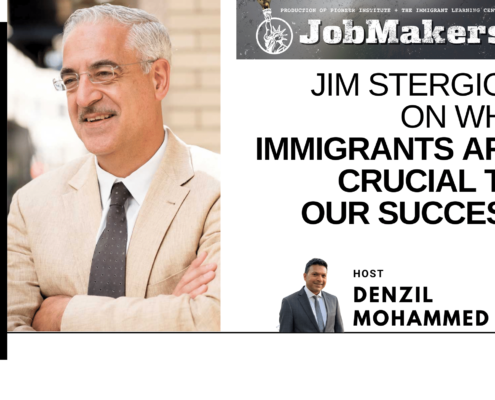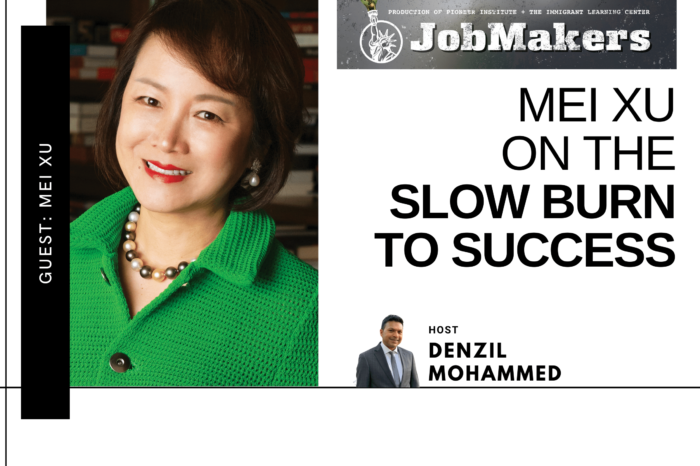Mei Xu on the Slow Burn to Success
/in Economic Opportunity, Featured, JobMakers /by Editorial Staff
This week on JobMakers, host Denzil Mohammed talks with Mei Xu, immigrant from China and founder of Chesapeake Bay Candle, which was acquired by Yankee Candle parent company Newell Brands for $75 million. Mei describes the journey to entrepreneurship, and how she created opportunities for herself. Today, she seeks to empower women business owners around the world, to show them that they too can expand economies and horizons with a little guidance. As she says in her new book, Burn: How grit, innovation, and a dash of luck ignited a multi-million dollar success story, “I hope to convince you, the American Dream remains vital and accessible to all of us,” as you’ll discover in this week’s JobMakers.
Guest:
 Mei Xu is a Chinese American entrepreneur, author and founder and CEO of three global companies, Yes She May, BlissLiving Home® and Chesapeake Bay Candle®. Xu successfully negotiated the sale of Chesapeake Bay Candle to Newell Brands in 2017, a conglomerate with a $14 billion portfolio of consumer goods. Mei is now focused on helping women-owned consumer product companies grow and prosper with e-commerce platform, Yes She May. In 2021, Mei launched her memoir, Burn: How Grit, Innovation, and a Dash of Luck Ignited a Multi-Million Dollar Success Story, that details her inspiring journey from coming to the United States as an immigrant to founding her own multi-million-dollar business. In addition to fostering women’s entrepreneurship, Ms. Xu also actively participates in impact investing, is a member of the Investment Committee of Halcyon Fund in Washington, DC, and serves as a trustee of the University of Maryland, Baltimore. Her business achievements have repeatedly been recognized by prominent organizations, such as Politico’s 2019 Woman of Impact Award; Smart CEO with the Brava Award; and the Asian American Chamber of Commerce with the Business Leader of the Year Award.
Mei Xu is a Chinese American entrepreneur, author and founder and CEO of three global companies, Yes She May, BlissLiving Home® and Chesapeake Bay Candle®. Xu successfully negotiated the sale of Chesapeake Bay Candle to Newell Brands in 2017, a conglomerate with a $14 billion portfolio of consumer goods. Mei is now focused on helping women-owned consumer product companies grow and prosper with e-commerce platform, Yes She May. In 2021, Mei launched her memoir, Burn: How Grit, Innovation, and a Dash of Luck Ignited a Multi-Million Dollar Success Story, that details her inspiring journey from coming to the United States as an immigrant to founding her own multi-million-dollar business. In addition to fostering women’s entrepreneurship, Ms. Xu also actively participates in impact investing, is a member of the Investment Committee of Halcyon Fund in Washington, DC, and serves as a trustee of the University of Maryland, Baltimore. Her business achievements have repeatedly been recognized by prominent organizations, such as Politico’s 2019 Woman of Impact Award; Smart CEO with the Brava Award; and the Asian American Chamber of Commerce with the Business Leader of the Year Award.
Get new episodes of JobMakers in your inbox!
Read a Transcript of This Episode
Please excuse typos.
Denzil Mohammed:
I’m Denzil Mohammed. Welcome to Jobmakers.
Denzil Mohammed:
I was once given some interesting career advice, create your own job, bit of a daunting task. If you ask me yet from millions of immigrants to the us, that’s exactly what they do. They become entrepreneurs. For Mei Xu, immigrant from China and founder of Chesapeake Bay Candle, which was acquired by Yankee Candle parent company, Newell brands for $75 million, dashed dreams and miserable timing forced her to create opportunities for herself. She describes this journey to entrepreneurship and what it takes to be successful today. She seeks to empower women business owners around the world so that they too can expand economies and horizons with a little guidance. As she says in her new book burn how grit innovation at the dash of luck ignited a multimillion dollar success story. She’s come to convince you that the American dream remains vital and accessible to all of us. As you’ll discover in this week’s Jobmakers,
Denzil Mohammed:
Mei Xu, founder of Chesapeake Bay Candle, and “Yes She May,” and author of, “Burn: how grit innovation, and a dash of luck ignited a multimillion dollar success story.” Welcome to the Jobmakers podcast. How are you?
Mei Xu:
Very good. And thank you for inviting me, Denzil.
Denzil Mohammed:
We’re honored to have you So tell us who is Mei and what does your company stand for?
Mei Xu:
Mei is someone that’s passionate about creating a little bit better things that we use on a daily basis while doing so providing a better experience to consumers. That’s what I did with my first company Chesapeake bay candle. And what I’m trying to do is build on that. I also want to be able to help other women entrepreneurs.
Denzil Mohammed:
Could you just sort of give us, paint us a picture of what life was like back in China when you were growing up?
Mei Xu:
I actually moved here after Tianamen Square. After 1989, I moved January of 1991, when I was growing up. I was born in 1967. So you can see how old I am an era when China was completely blocked off from the rest of the world. The race of the country is, mostly there are 50 other minorities, but you listen to the way that people talk. You look at the way they dress. You look at everyone’s salary, you know, it’s all transparent. You see exactly how much everybody’s making, everybody’s living. Exactly the same style buildings. You used shared bathrooms and kitchens. So it’s a very interesting time when there’s not a lot of desires, but there’s also not a lot of sort of comparisons because everyone gets exactly the same. Remember it’s it is socialism after all
Denzil Mohammed:
Very interesting it’s, it’s a life that I can’t even begin to imagine what that was like, shared bathrooms and kitchens.
Mei Xu:
You know, I grew up – in my book. I mentioned I grew up until age eight sharing a room with my mom and dad and my sister one room and my sister and I squeeze into a little bed. And my mom and dad is on the other bed. And then we don’t even have much furniture. So there is a table for, for food. And that also serves as our desk. And we have one cabin for clothing because we don’t have that much clothing and one trunk that’s about everything I can remember.
Denzil Mohammed:
So when China opened up after President Nixon’s visit in 1972, you’ve said the government needed diplomats to all these countries that were suddenly going to do business with. Mei, you were one of those selected for the very first batch and you enrolled in a boarding school where you were taught English and all about American culture and ideology.
Denzil Mohammed:
That must have opened up a whole new world for you to learn about other cultures like that. Especially since growing up, it was so insular and, and parochial
Mei Xu:
Isolated.
Mei Xu:
Exactly,
Mei Xu:
Exactly.
Denzil Mohammed:
So therefore, what prompted you to start Chesapeake bay candle? It seems like a whole other world compared to diplomacy.
Mei Xu:
So I met a very interesting sociology professor who was teaching at that time in Beijing, but a visiting scholar from Dartmouth college. And she recommended me to work for her husband who is in charge of one of the offices affiliated with the World Bank mission in Beijing. So that’s when I started to work part-time for the bank as a translator in the beginning, but later on taking on more coordinating coordination roles. And I loved it and I wanna work for the bank after I graduat, but I graduated in 1989. If everybody remember the world witnessed in the summer of 1989, the brutal incident on the square, what the world didn’t know is that those of us who graduated that year got the worst bargain because we were all sent away from Beijing or Shanghai, so that students won’t gather immediately again.
Mei Xu:
And I was assigned to look after a warehouse of minerals for export to other countries, and it would not allow me to practice any foreign language, let alone diplomacy. So I resigned which in 1989 was unheard of, particularly with such a training and such a prospect of being a diplomat in the future. But I resigned because I just feel miserable and I felt I’m going to lose my 10 years of learning. And I always wanted to advance my degree anyway and, and United States is always my number one choice because I was majoring in American studies. That’s how I ended up in Maryland. University of Maryland saw me in the beginning of 1991 because I want to learn mass communication and journalism so that I can go back to help the world bank missions, where they work with the local community and the government to achieve their goals.
Mei Xu:
But again, I graduated with unfortunate events in 1992, when our country United States was fighting Iraq. And because us is the biggest donor for the world bank, they did not have enough money to make their pledge. So I indeed took myself to New York city, very exciting, but the job was not very exciting. And it, the salary is even worse, $19,000 to be an assistant export manager, helping a company export medical equipment to China. That’s when, although I wasn’t happy with my job, I was put next to an amazing place called Bloomingdale’s and Bloomingdale’s to me is like paradise. Imagine I grow up without much of a material indulgence. So Bloomingdale to me is like a fairy land. You look at the perfumes and the fashion, and I loved the fashion at that time because it already had a very strong point of view.
Mei Xu:
I don’t know if you remember, the, the shoulder pads were very in for the nineties, but then as I went up the floors on Bloomingdale’s escalator, I recognized that more floors. I, I went up the more ordinary, a mundane and unattractive the merchandise become until I went to the top floor. And it’s the worst, that’s the home product floor. And it just like you entered what on the movies would be some old, very antique, you know, home. So I just asked myself, I said, if someone was wearing this powerful Donna Karan power suit, why would she wanna go back to such a dark and old fashioned home? So I talked to my then husband, David, who’s working in DC and I was in New York during the week – so I was commuting – every night on the phone. And we also have a lot of friend in China at that time.
Mei Xu:
Who’s now dealing in foreign trade. So one day he just said, Mei, you’re so unhappy. I’m very unhappy that you’re not here with me. Why don’t you just quit? And I will quit too. We’ll just start a business. And we’ll maybe do something with home product because you seem to have a lot to say about what you don’t see and why is that the case? So that’s how we started because we don’t find any opportunities for ourselves. So we created opportunities. And that’s what I think going back your, to your immigrant story is probably what happened to be the decision. A lot of us made we’ll just have to risk it all because we don’t have a lot to lose. So as China become the factory of the world, what they really need is also a lot of people that can be in foreign trade.
Mei Xu:
So that’s what happened. A lot of my friends end up being foreign trade for the country. As a lot of those initial foreign trade organizations are government owned. And I asked them for help. I said, do you guys have any home-related products? So they sent me a lot of product. We resigned both in 1994, and I moved back from New York to Maryland. And we went back to China and we took with us a ton of samples ranging from silk flowers, you know, those fake trees and fake flowers so that people don’t have to water them to cushions for your car car seats, to musical dolls and decorative fence on the, you know, with the Chinese calligraphy to some very unassuming candles, you know, they’re shaped like a ball and they have patterns like stain glass, stainless steel, a stain glass.
Mei Xu:
So we didn’t know what to do with it. We just brought everything with us to a trade show. And until today, I still tell everyone who come to me and say, how can I validate an idea? If I have a great idea for product, how can I validate a service? I always say, stop asking your parents, stop asking your friends. They’re not gonna be as helpful as taking it to the market because the market is very efficient in this country. It will tell you whether they like it or not. So when I came back with all the samples, it was already in September. So I scrambled and I found one trade show is in North Carolina, in Charlotte, North Carolina. It’s a very, very small regional cash and carry, which means it’s so late that people will pay you and you ship them right away so they can make it to the product for holiday. It’s a cash carry trove. We drove all the way there with our borrowed van. And we put all the silk flowers, all the seat cushions, fans, music dolls, and the box of candles. And we arrived and set up a 10 by 10 booth, but we don’t really know how to set up. We just put small items in the front, bigger items in the back, and we just wait for orders. And guess how much orders did we get in five days of trade shows? Just take a guess
Denzil Mohammed:
A hundred,
Mei Xu:
A hundred orders. Yeah. Worth how much, take another guess the candles cost about $5 wholesale, the most expensive item, maybe $20 wholesale,
Denzil Mohammed:
A thousand dollars
Mei Xu:
Take a wild guess. No much more – $52,000. Probably you are right about a hundred orders. I would say probably a little bit more than that. That is a hundred small retail stores trusting us to provide them product before Christmas so they can sell them. Right. And that’s not a small change. Even after our business is much bigger. We went to New York, which is an international trade show, $52,000 for five days. It’s a, it’s a fantastic number. Not only did we get a lot of good feedback, but we know what we should focus on after that, because most of the orders were placed for the candles. And it was the least expected because it’s so small. And we just don’t know because we are from China, we don’t use candles to enhance the mood or to set a romantic dinner. We just use them when the light went out and guess how much we sold the first year from September to December,
Denzil Mohammed:
Given the 50, a hundred thousand dollars,
Mei Xu:
$550,000. So it’s an amazing, even for now, I can’t believe how fortunate we are. It just shows to you. If you have observations, if you see a gap, if you see an opportunity and you bring it out at the right moment, with the right pricing, you get rewarded. And that’s how good we got rewarded. First year, people love the candles. As a result, we learned that they buy those candles to give each other a gift, right? Everybody has 20, 30 people on their list, $10. It’s not a big gift, but it’s very special. You light it up. It is a topic for conversation.
Denzil Mohammed:
You know what I gave my boss for Christmas last year, I sent a candle. I can
Mei Xu:
<Laugh> <laugh> okay. Now, you know? Right.
Denzil Mohammed:
And one thing that, that really strikes me in just having this conversation with you is that you did not have a business background. You didn’t study business, you didn’t get an MBA, but all of this business savvy is just, is just flowing out of you right now. And that’s quite incredible.
Mei Xu:
Finance is always part of my, my, my work as well, because I’m very customer facing, right? I, I was the one that negotiated most of our first relationship with big companies. And when you deal with them, you have to understand your numbers. You have to understand how to ask questions. You have to be able to digest information in a way that you see trends. So one of the things I say I I’m very good at.
Denzil Mohammed:
But your latest endeavor, yes, she may is a very unique business. Why did you choose this particular kind of business and what makes it special?
Mei Xu:
I think I’m the only one that is doing a for-profit business for women. We have a lot of nonprofit that advocate women’s entrepreneurship that are investing in women-owned companies in funding, or help them in connecting with major buyers. There are, I can name a lot of them. What is different in what I’m trying to do is that I often see what their restraints are, right? So I have a very good friend in Elizabeth Vaser, who is the founder of reconnect. It’s an organization that promotes big companies like IBM or target or Walmart to buy from international women-owned businesses so that they can help them to grow their business savviness and their economic power that has implications, right? When women are more economically dependent, independent, they can send their kids to school and they can take those kids out of the streets. They can provide opportunity for them to become entrepreneurs or have a regular job.
Mei Xu:
That means they’re not fighting on the street. They provide stability and growth. So that’s why, you know, a lot of big corporations work with her to certify those companies and then train those women to work with bigger companies. The problem is even when they are making that connection, can a target really work with someone in Tanzania that is never even make $100,000 worth of product because the first order, most likely is gonna be a million dollars for a 1800 store chain. Can they figure out how to teach them? You know, all these things in, in, in a short, in a short period of time, so they can graduate, have the best practices and continually supply them. It’s very hard. So to make that leap frog of a development, they need people like me, people that are incubators that can train them to first work with smaller companies or smaller businesses that can be patient that can let them learn their ropes even translate their instructions into English, take good photos. And then gradually, if they continually have product that people want, then they get to the next level to work with bigger companies, such as a 10 store chain, okay. Or website that has more traffic. Eventually, if they get everything right, they may have a shot to work with a Macy. So to me, this is fundamentally an incubator
Denzil Mohammed:
From your writing. It is that the connection between being an immigrant and being an, an entrepreneur is something that is very, very real. Can you expand on this? And you know, what is the connection between being an immigrant and being an entrepreneur?
Mei Xu:
I would say, look at how many major companies started by immigrants, right? So if you look at Google, if you look at zoom DoorDash, sure. I can go on and on. And I think it’s not accidental it’s because I think they do have something they share in that they’re not afraid to abandon. What’s known what’s arranged for them, what everyone else is doing. They’re willing to take a risk to give their passion and their dream, a real shot. I do see the similarities between entrepreneurs and immigrants. And I do see that that’s one of the reason why they create companies because often they have nothing that is offered to them on a silver platter.
Denzil Mohammed:
One thing that has occurred to me in hosting this podcast is that that thing called the American dream appears to be stronger outside of all borders, that it is among its residents in your book burn, how great innovation and a dash of luck ignited a multimillion dollar success story. You know, it’s inspirational and optimistic, but you do write that the world has become more pessimistic, protectionist and insular. And that ultimately you hope to convince the reader that the American dream remains vital and accessible to all of us. How do you go from pessimistic, protectionist and insular to believing in the American dream?
Mei Xu:
When I was writing the book I had just came out of four years of being under this president who was very dramatic, not very democratic himself, but hope for the first time, really put into the very front, a national dialogue about the dislike of immigrants, the displeasure of other cultures, the judgment of other race, which is so to me. So blazant, you know, so just, I would not never imagine in when I came here in 1991, that this could happen. I know they existed. You know, we see the KK Ks demonstrations. We know the African Americans being lynched. The Asian Americans called names are Chinese Americans being called, you know, the chinks. These things didn’t happen to me. Fortunately, but I can relate to those. So to hear your own president talking like them is shocking to me.
Mei Xu:
It it’s a real wake up call that not only those sentiment exist, that it exists and it’s alive and it’s actually growing at that time. I’m very hopeful that our children, that’s where I find a hope is that my children and many other children that I’ve known since, you know, I have children. I think they do recognize that we cannot go back just like China cannot close its door and pretend that nothing will ever happen the way that it was for the last 40 years. People have tasted the power of freedom, the power of free speech, the power of free economy. And they have benefited. Why would they go back to an era where they can barely afford to have meat every day? They can barely afford to have new clothes when they really wanted it. So in innately, I feel we are always making progress as a race. We’re just taking two steps back, maybe three back three steps forward. And at the core of this nation is that fundamentally, we are a nation of immigrants.
Denzil Mohammed:
This was a really, really incredible and fascinating conversation. I, so thank you for making the time to do this. I know how busy you are. Me, she founder of Chesapeake bay candle, and yes, she may and author of burn how great innovation and the dash of luck ignited a multimillion dollar success story. Thank you so much for joining us on Jobmakers
Mei Xu:
Thank you. Denzil
Denzil Mohammed:
Jobmakers is a weekly podcast about immigrant entrepreneurship and contribution produced by Pioneer Institute, a think tank in Boston and at the Immigrant Learning Center in Malden, Massachusetts, a not-for-profit that gives immigrants a voice. Thank you for joining us for this week’s inspiring story of immigrant entrepreneurship. Remember, you can subscribe to Jobmakers on apple podcast, Spotify, or wherever you got your podcasts. And please leave us a review. I’m Denzil Mohammed. So your next Thursday at noon for another Jobmakers.
Recent Episodes:
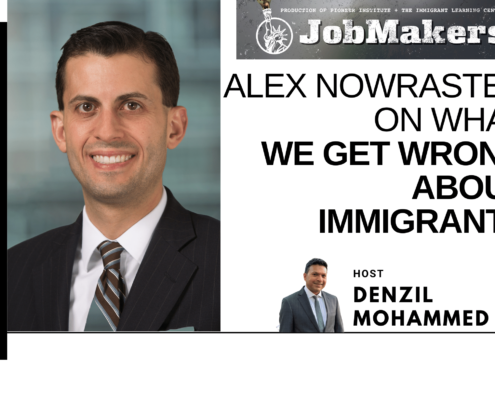
Alex Nowrasteh on What We Get Wrong About Immigrants
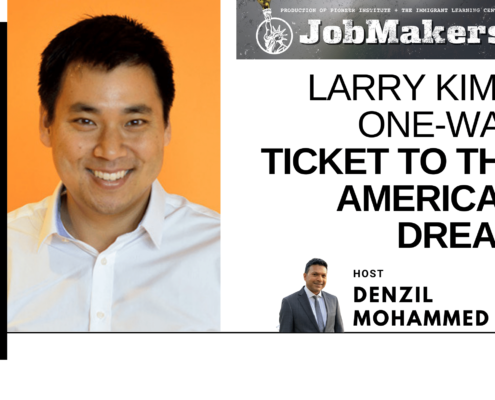
Larry Kim’s One-Way Ticket to the American Dream
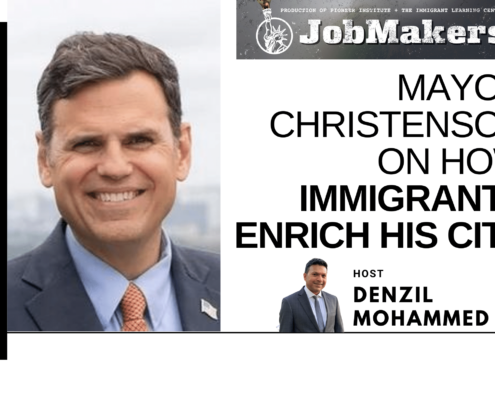
Mayor Christenson on How Immigrants Enrich His City
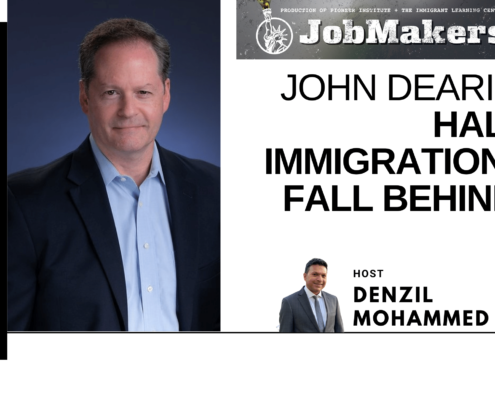
John Dearie: Halt Immigration? Fall Behind
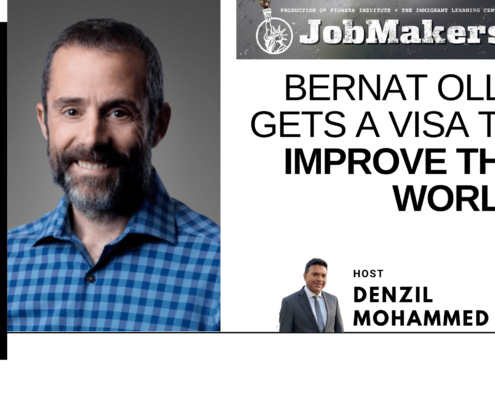
Bernat Olle Gets a Visa to Improve the World
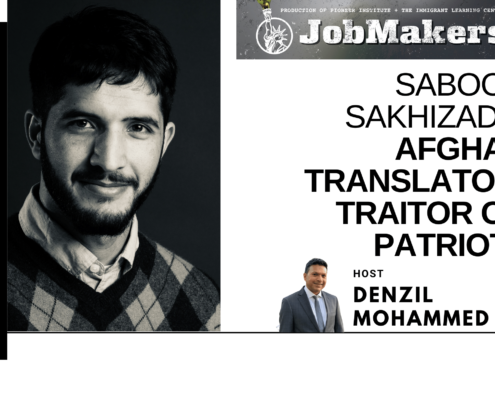
Saboor Sakhizada, Afghan Translator: Traitor or Patriot?
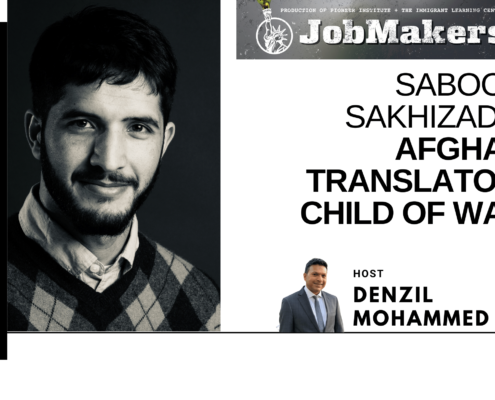
Saboor Sakhizada: Afghan Translator, Child of War
